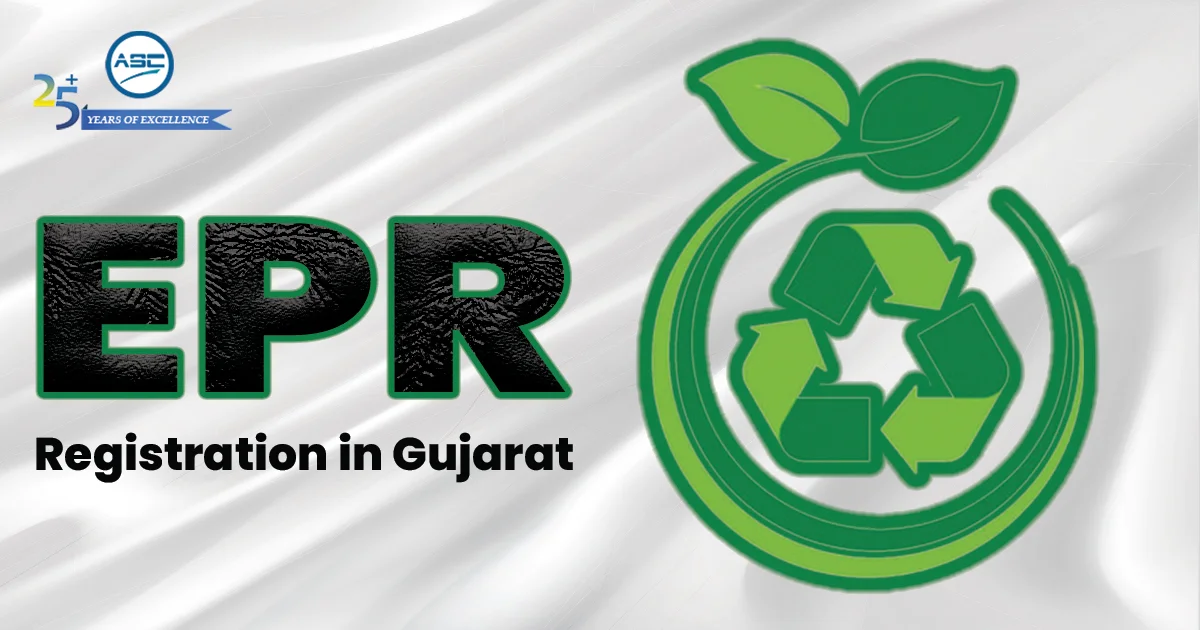EPR Registration in Gujarat

Extended Producer Responsibility (EPR) Registration makes the manufacturers responsible for end-life-management, including collection, disposal, and recycling in an eco-friendly manner. As per the recent notification issued by the Government of India, complying with EPR regulations is mandatory for the producer, importer, bulk-consumer, and brand-owner of plastic, e-waste, battery-waste, etc. ASC Group is a government-certified PRO (Producer Responsibility Organization) and an EPR Consultant in providing end-to-end waste management services in Surat, Vadodara, Rajkot, and all cities of Gujarat and PAN India.
Key Objective on Implementation of EPR Registration in Gujarat
Here are some key objectives of EPR registration in Surat:
- Shift responsibility for waste management generated by-products from local governments and taxpayers to producers, importers, brand owners, etc.
- Encourage sustainable product design and reduce waste generation
- Increase recycling rates and reduce waste
- Create financial incentives for producers to collect and recycle their products.
- Improve waste management infrastructure
- Reduce the environmental degradation impact generated by the product waste
Applicability of EPR Registration in Surat
The CPCB has implemented EPR regulation on broad categories of products under the Waste Management Rules, which are implemented to the following companies:
|
Electronic Waste |
Plastic Waste |
Battery Waste |
|
|
Producer |
Yes |
Yes |
Yes |
|
Importer |
Yes |
Yes |
Yes |
|
Brand Owner |
Yes |
Yes |
Yes |
|
Bulk Consumer |
Yes |
No |
No |
Under the EPR regulations, these companies are required to register with CPCB and SPCB to fulfill their EPR compliances to time to continue operating in India, including collecting, disposal, and recycling waste generated from their products. CPCB has also expanded the responsibility of EPR registration to other product categories, such as e-waste, batteries waste, tire waste, and other hazardous waste.
Documents Required for the EPR Certificate in Gujarat
Here are all the documents required for EPR registration in Surat, Vadodra, or Rajkot:
- Business registration documents
- PAN Card
- GST registration certificate
- Bank details
- Authorization letter
- EPR plan
- Annual report
How ASC Group Can Help You in Getting EPR Registration in Gujarat?
At ASC Group, we can assist in not only obtaining EPR Certificate in Vadodara but also helps in completing EPR Compliance matters in Surat, Vadodara, Rajkot, and all cities of Gujarat and PAN India. It ensures that your business is compliant with the EPR regulations. It is highly recommended to connect with a professional and certified Producer Responsibility Organization for comprehensive waste management service and obtain EPR Registration in Surat as per government regulation.
- Assists in meeting EPR Compliance and regulations as per the legal obligations
- Advice in the execution of waste management targets like collection, filtration, disposal, recycling, etc.
- Arrange in filing annual and quarterly returns with the CPCB department
- Assist in the documentation process, preparing EPR plans like recycling, collecting, performance reports, etc.
- Assist in obtaining of EPR Certificate in Gujarat from the CPCB department.
- Help producers with EPR regulations and manage the waste of their products to meet legal requirements and promote sustainable waste management activity.
